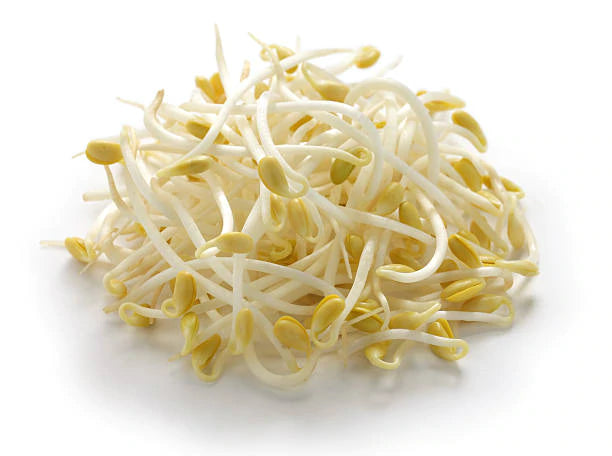30 High-Protein Vegetables and Fruits and the Best Daily Intake

MPeople have several reasons why they would wish to increase their daily protein intake, but there is a limit to how many chicken breasts and steaks you can eat. Maybe you're a strict vegetarian who struggles to obtain enough protein in your daily meal plan.
That is the purpose of this post. We provide a comprehensive list of the top 30 high protein vegetables and fruits to factor into your diet. Some of these foods are a little unusual, and some are not veggies or fruits per say, but if you are looking for protein for your diet, this post will interest you!
You have undoubtedly heard nutritionists talk about proteins in their entirety before, but if you are unsure what it's all about, read on. Let's get started.

The Top 10 High-Protein Vegetables
What are high-protein vegetables? These are vegetables containing natural and vital biological components such as catalysts, enzymes, and antibodies.
01: Lima Beans
Because of their rich, buttery feel, these precious tiny beans are also called Butter Beans. They make an excellent mash as a low-carb substitute for potatoes, or they may be added whole to a dish.
These little beans are powerhouse protein-rich vegetables of nutrition, including a high iron level, fiber, and potassium. While some individuals dislike the flavor, the recipes below might help.
Try these recipes:
● Lima Beans with European Flavour
● Herbed Hummus with Lima Beans
02: Edamame
Edamame is high in plant-based protein, folate, and iron. There is an intriguing relationship between reproduction and a high diet of polyunsaturated fats, folic acid, and organic meals.
If you usually eat edamame at a restaurant, it's time to try eating it at home. It's high in plant-based protein, minerals, and vitamins.
Here are some of the recommended recipes:
● Edamame Spicy
● Crispy Parmesan Garlic Edamame.


Photo Sources: Online
03: Peas
Peas are high protein vegetables rich in zinc, anti-oxidation, vitamin C, and vitamin E and are healthy for your immune response. With Pease, you also get cholesterol and vitamins A and B, which help with inflammation and lower your risk of chronic diseases like diabetes.
You're not alone if you believe green peas are soggy and unappealing. However, they are adaptable and may be a tasty complement to many cuisines.
Try these recipes:
● Veggie Burger Green Monster
● Crispy, roasted green peas
04: Bean Sprouts
By regulating cholesterol, bean sprouts may enhance your general cardiovascular health. Bean sprouts may help with blood cholesterol levels, which trigger the building of vascular buildup. Bean sprouts may also boost levels of "healthy" cholesterol, which also aids in the removal of plaque in the arteries. A bean sprout is a delightful, fresh, nutty flavor that you can use in many dishes.


Photo Sources: Online
05: Green Peas
Peas are an excellent option for many weight-loss regimens since they are low in fat and high in protein and fiber. If you follow a low glycemic meal plan, a low-calorie intake, and mainly vegan and vegetarian diets, you might think about having peas in your meal.
06: Spinach
What would a list of the highest protein veggies be like without the most well-known muscle-building vegetable, spinach? If you look at the athletes, you will see that eating veggies will make you powerful.
Spinach contains essential nutrients that help your immunity, such as magnesium and vitamin E; this safeguards you from disease-causing viruses and germs and protects you from harmful toxins.


Photo Sources: Online
07: Sweet Corn
Sweet corn is high in carbs, protein, minerals, and vitamins. Sweet corn is an excellent probiotic because it includes several healthy bacteria in the gut that help digestion and promote improved metabolism, resulting in weight loss.
Sweet corn is both healthy and delicious. For your body to respond positively to proteins, try using sweet corn in dishes throughout the year.
08: Asparagus
Asparagus is a good source of protein and is rich in nutrients. Furthermore, eating asparagus may provide a number of health benefits, such as weight loss, smooth digestion, a successful pregnancy, and decreased blood pressure.
Fresh asparagus has 4.32 g of total protein per cup (boiled) and is the epitome of spring. Try roasting, grilling, or steaming these tasty spears.


Photo Sources: Online
09: Artichokes
Artichokes are full of fiber, minerals, calcium, and antioxidants but low in calories. They are abundant in folic acid, vitamins C and K, and essential minerals like calcium, magnesium, salt, and iron.
10: Brussels Sprouts
Brussels sprouts, just like various leafy vegetables, help prevent cancer of the breast, kidneys, stomach, and prostate, among others. Crunchy vegetables, such as Brussels sprouts, protect the body from health problems like diabetes, high blood pressure, blood cholesterol, and cardiovascular disease.
11: Kale
Kale, like most other green vegetables, has a lot of antioxidants. This includes a variety of photochemical phenols like vitamin C. Oxidants are chemicals that prevent oxidative free radicals in the system.
12: Mushrooms
Mushrooms are high protein vegetables foods and a good source of protein, fiber, and antioxidants. They have very little fat. They may also protect you from significant health problems, including cancer, cardiovascular disease, cancer, and hypertension. They are also excellent suppliers of selenium.
Prepare your beef stew for a hefty helping of protein-rich mushrooms. These amazing little creatures are tasty, simple to prepare, and extremely healthy, containing high amounts of vitamin B, folic acid, and vitamin D.


Photo Sources: Online
13: Broccoli
Broccoli is a nutrient-dense veggie that benefits your body in massive ways, including lowering irritation, boosting blood sugar control, increasing immunity, and encouraging the cardiovascular system. Please remember, however, that excellent nutrition does not originate from a single cuisine.
The excellent broccoli is the grab vegetable in many athletes' diets. It has fewer carbs (0.4g per 100g), more soluble fiber, and more protein for every calorie than steak!
Roast the broccoli with ginger, olives, and salt. It's a fantastic new method to renew your passion for these small green trees.
14: Potatoes
Potatoes are high in fiber, which might lead to weight loss by keeping you fuller for longer. Fiber can reduce the risk of heart problems by maintaining healthy blood sugar and cholesterol levels. Potatoes are also high in antioxidants, which help prevent the spread of disease, and vitamins, which help your system work efficiently.
The dependable spud gets bad press. It's actually high in protein. For an even higher protein increase, use crisp or red potatoes. You get extra nutrients if you consume the shell!


Photo Sources: Online
Top 16 High Protein Fruits
Here are the high protein fruits.
01: Guavas
Guava is a tropical delicacy. It has approximately 4 g of protein for every cup and is the largest protein-containing fruit. The traditionally ultra-fruit is also high in fiber and vitamin C, particularly if you take the peel and seed pods.
02: Avocados
Avocados are rich in many nutrients, and they also have 3 g of protein per cup. Generally, avocados are full of vitamins C and E, folic, calcium, zinc, nicotinic, and fiber. The taste of a mix of fats and fibers is fantastic and will also keep you satisfied.
You can use an avocado for much more than simply guacamole. For a luscious, dense, and protein-rich twist, you should try avocado as a dessert.
03: Apricots
A serving of fresh apricots has 2 g of protein. The block fruit is also high in nutrients and vitamins A and C, which are beneficial to eyes and healthy skin. It is full of fiber in the flesh and skin, and it improves digestion and keeps you full.


Photo Sources: Online
04: Kiwifruit
You can also clean the skin and use it. Each cup of kiwi has roughly three grams of protein. The skin of kiwifruit is full of fiber. Kiwi is also high in iron, vitamin C, calcium, and magnesium.
05: Blackberries
Interestingly, each cup of fresh blackberries has around three grams of protein and seven grams of fiber content. You will also get nearly half of your daily vitamin C requirement, and strong quantities of complimentary antioxidants and central nervous system polyphones.
06: Oranges
Oranges include vitamin C, which benefits your health in different ways. It shields your cells from harm. It aids your body's skin elasticity, a protein that promotes wound healing and smoother skin. It also makes iron absorption simpler, which aids in treating anemia.


Photo Sources: Online
07: Bananas
Bananas are high in nutrients and calcium; eat one to prevent leg cramps! However, one cup contains roughly 2 grams of protein. They are a good source of dietary fiber, probiotic bacteria, and magnesium. And, just so you know, you should take those straggly portions called hyphae bundles. They act as a conduit for all of the nutrients contained within the fruit.
08: Cantaloupe
Cantaloupe has the whole percentage of your recommended intake of vitamin C, a potent and excellent source of antioxidants that protect your tissues from injury. It also has all of your levels of vitamin A requirements, which aid in protecting your eyes, complexion, joints, and immune response, are met.
09: Raspberries
The raspberry contains potassium, which is necessary for respiratory rate and lowers blood pressure. Raspberries' healthy fats can effectively deter stroke attacks and cardiovascular diseases. They also include manganese, which is required for tissue and bone and aids with blood sugar regulation.


Photo Sources: Online
10: Peaches
Peaches' fuzzy exterior and delicious meat are high in antioxidants such as vitamin C, flavonoids, and carotene. Antioxidants are plant components that combat cellular injury, and phytonutrient meals can help strengthen your immune system from withering and diseases like cancer.
11: Jack Fruit
Jack fruit is a delicacy connected to plums, and its immature flesh has an uncanny resemblance to jerked pork. Each cup of this has up to 4 grams of protein. It comprises 3.3 g of fiber and 120 mg of potassium, healthy for the heart, magnesium, vitamins A and C, calcium, cholesterol, zinc, and iron. A spoonful of crispy roasted chickpeas is a nutrient-rich breakfast combo.
12: Cherry
Cherry is the season's best delectable treat, containing around 2 grams of protein per cup when served naturally. They're high in potassium, which reduces blood pressure and is necessary for muscular function. Cherry is also high in antioxidants and anti-inflammatory compounds.
Cherries are also high in melanin, which can aid in getting a good amount of sleep. When the cherries have finished ripening, you can freeze them and use them in smoothies.


Photo Sources: Online
13: Grapefruit
Each cup of juicy grapefruit has 1.5 grams of protein and less than 100 calories. It contains naturally resistant vitamin C and bone-strengthening iron and calcium, as do many other fruits and vegetables. Grapefruit's acid helps avoid kidney problems as it blends the calcium with the body.
14: Tomatoes
Tomatoes are high in a compound known as lycopene. The lycopene gives the vivid red color and protects tomatoes from the sun's UV radiation. It can also effectively safeguard your cells from injury in the same manner. Tomatoes also contain calcium and other minerals.
15: Prunes
Prunes are high in soluble and insoluble fiber. Insoluble fiber promotes regular bowel motions, whereas soluble fiber aids metabolism and the absorption of nutrients from meals. Dried prunes also possess glucose and epicatechin acid, both of which can help you with your stools.


Photo Sources: Online
Conclusion
A whole protein has a sufficient amount of all nine necessary amino acids. These amino acids include valine, histidine, isoleucine, lysine, methionine, tryptophan, threonine, leucine, and phenylalanine.
The amino acids are required for us to survive, flourish, and rejuvenate our bodies following workouts. Most fruits and vegetables are not complete proteins because they only possess a handful of these nine amino acids. You will get plenty of these vital amino acids if you consume a wide mix of fruits and vegetables. You can get everything you need from fruit and vegetables!
However, if you are not a vegan, meat has all nine of the necessary amino acids, making it a complete protein. Protein deficits are unusual among vegetarians and vegans, particularly those who keep a healthy meal plan. Nonetheless, some people may want to increase their plant protein consumption for a number of reasons. You may use this list as a starting point to incorporate extra high protein vegetables recipes into your meals.






